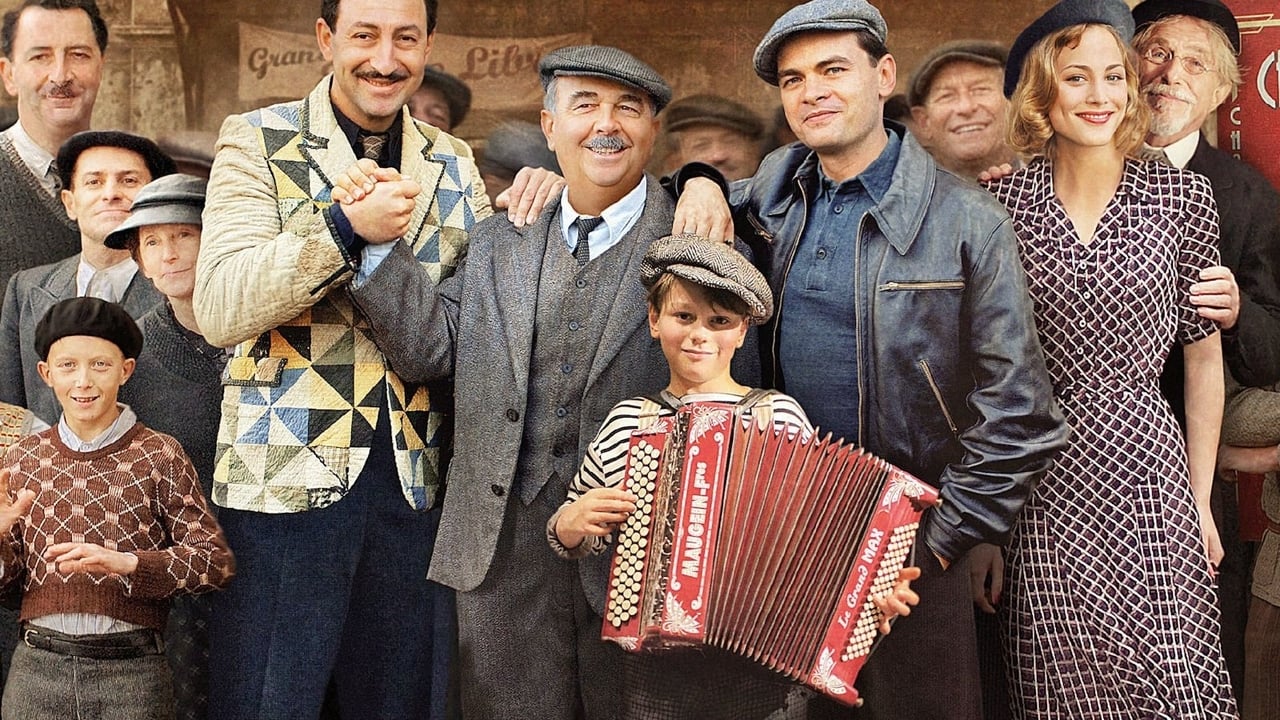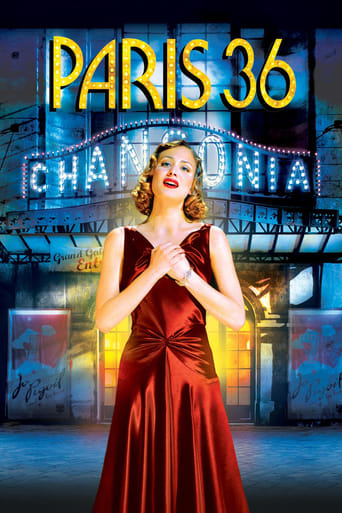

The story is a musical drama and comedy that revolves around Chansonia, a music hall in Paris Faubourg. On New Year's Eve of 1935, the hall's manager, Pigoil, loses both his wife and his steady job when he discovers that she is cheating on him and leaving him for another man and the hall gets closed down when the owner commits suicide because he cannot pay his debts to the local mobster, Galapiat. Months later, our poor protagonist loses his beloved son Jojo as well when the child is given to his ex wife because Pigoil has no job and cannot support the child. This pushes Pigoil to get income by reclaiming Chansonia with the help of Jacky and Milou and the rest of the former employees of the hall. Galapiat decides to give them a month to prove that they can make the place profitable again. Meanwhile, a beautiful young woman named Douce crosses their path who is brought on as an announcer but ends up wowing the audience with her voice. She catches the attention of both Galapiat and Milou but instead of offering her heart to either one, she runs off to further her career by joining a more promising company. The Chansonia's reopening turns out to be a disaster and this, together with no word from his son despite his many letters, drives Pigoil to desperation and up a ladder from which he falls off.It's all so depressing but things get better (how could it possibly get any worse?) when the "Radio Man" who fears the outside world and only stays inside his house hears Douce's voice and realizes that she is the daughter of the woman he was in love with, the woman who used to be Chansonia's star whom he composed songs for. So he runs after Douche and convinces her to come back and with his new songs, make Chansonia grand again. Meanwhile, Pigoil has not died from the fall but only injured his foot. He goes home to find that his landlord was claiming all his possessions. He prays them spare his son's accordion and brings it to him. But Jojo is not home, so he just leaves it on the boy's bed, pausing to inhale his son's fragrance from the shirt on his bed. Much later, Jojo inadvertently discovers that his mother had been hiding his and his father's letters. Back home, Pigoil is roused from his furnitureless apartment by a serenade below his window - his beloved Jojo had come home to play him a tune on his accordion.The Chansonia rises from its ashes and they make enough money to buy it back, but things go awry with the Galapiat-Douche-Milou love triangle. Two innocent characters become victims of the crossfire. When Galapiat discovers that Douche and Milou are lovers, he sends his henchmen to kill Milou and steal his money, but they end up killing Jacky. When Milou runs after Galapiat for this, Pigoil trails after him and ends up killing Galapiat. He ends up behind bars. Ten years later, he is released and he walks towards a jam-packed Chansonia. He is about to ask the guard to tell the star, Jo Pigoil, that his father has arrived, but he changes his mind and tells the guard "nevermind, let him play" instead. He sits outside the music hall and listens to his boy making both their dreams come true for them. A somewhat sad yet still happy ending.It was a long movie with many subplots, but it was entertaining all throughout, despite the sadness. My favorite subplot was the main one about the father and son's great love for each other. It broke my heart to see Pigoil put Jojo's shirt to his face, like he really wanted to embrace his missing son, and my heart got so overwhelmed at the moment he crept back to the window when he realized that it was Jojo playing the accordion. I was also touched by the radio man's love for Rose. I shed tears for those scenes and a few more, but it was totally worth it. Tres magnifique! I am so watching more French films after this.
... View MoreA very nice cinematic experience. Everything was top notch - direction, script, acting, singing, scenography and costumes. The film leaves a warm feeling despite presenting many dark sides of life in Fauborg (outskirt of Paris) in the 1930s, like fascism, workers' strikes, unemployment, marital betrayal, loneliness. The director incredibly managed to mix pathos and sentimentality with sarcasm and sardonic humor in the same scenes, which prevented the film from being corny. Includes probably the best written funeral scene ever in my opinion. The songs are not remarkable, with one exception - a song about love where the main female character is virtually declaring love to a man from the stage. The female is a revelation, talented and beautiful young actress with good singing voice. I will gladly watch the film again.
... View MoreParis 36 (FAUBOURG 36) is a deliciously entertaining blend of history (WW II and the French reaction to the Nazis), of cabarets, French vaudeville, and the fracturing of families that occurred during times of stress - all costumed in a period piece that revives the year 1936 in Paris with gentle humor and sensitivity. It is as refreshing as anything to come on the screen in a long time. Writer/director Christophe Barratier (with Pierre Philippe adding the dialogue) serve up this confection with underscored aplomb and the result is delectable! 1936, and the streets of Paris are being decimated by the recession/depression of the times: workers are revolting (lead by the handsome young Milou - Clovis Cornillac), the small time theaters such as the Chansonia under the loving direction of Pigoil (Gérard Jugnot) are on hard times, and the 'big bosses' of the times are finding ways to take over small businesses. To make things worse, Pigoil's wife runs off with an entertainer, leaving Pigoil to survive unemployment with his beloved son - that son is soon reluctantly moved away to join his prosperous mother and new 'caretaker'. Into this sad turn of events comes a naive but wondrously winsome lass named Douce (Nora Arnezeder) who takes part in the revitalization of the Chansonia, supplying the meager audience with her growing talent while urging the public to applaud for a a loser of a nice guy performer - Jacky (Kad Merad). A little star is born. Somehow it all comes together despite innumerable setbacks, and in the end the people own their hearts and regain their pride. It is a simple story, but told with a glow of Parisian bloom that dissipates the gloom of the times and creates a moment of nostalgia well worth remembering. For an evening of joy this is a must. In French with English subtitles. Grady Harp
... View MoreNora Arnezeder reminds me of movie stars of the thirties : beautiful, charming, she can sing, dance, act... Star quality ! As for the film itself, the story is rather simple, which I come to realize, is often what makes it good. It's not so much what the story is about but rather how you tell it. And in that case, you get to laugh, cry, you care about that Pigoil who looses his job, his wife and even his son and who doesn't loose hope, about Milou and Douce's love story. You'll love the great new songs, the homage to Busby Berkeley, Jacky's lousy jokes (a reprise of Kad's own TV skit) and secondary characters played by first-rate comedians like François Morel and the great Pierre Richard. What's not to like ?
... View More